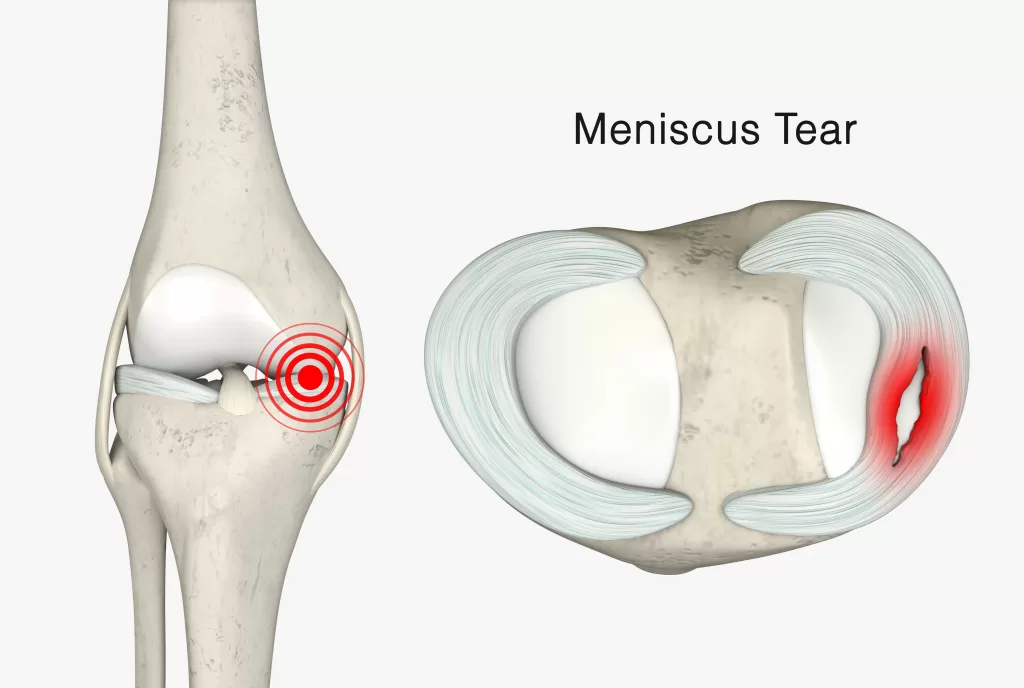Meniscus tear
Medically Reviewed by Dr Aifric Boylan
Last updated on 24.07.2024
The meniscus is cartilage in the knee that helps with cushioning of the joint during impact, such as running and twisting. A meniscal tear can occur when the meniscus endures trauma from activities like walking, sitting, exercising, and generally moving. Each knee has two menisci – the medial and lateral – and each is attached to your thighbone (femur) and tibia (shin bone). The medial and lateral menisci are both C-shaped, which when connected make an O-shape covering the whole knee. Because the meniscus cops a lot of trauma from these activities, sometimes it can tear. This can lead to potential issues.
What are the symptoms of a meniscal tear?
If your meniscus tears it can cause pain, swelling, stiffness, clicking and locking of the knee. Sometimes it can also feel unstable, like you can’t walk on it. The symptoms can fluctuate depending on the person and the degree of their meniscal tear. This means you may have mild symptoms that disappear quickly, severe symptoms that are daily or issues that come and go depending on how much you use your knee.
What activities are likely to trigger a meniscal tear?
The main triggers for a meniscus tear involve twisting injuries of the knee. This is most likely to happen with tennis, basketball, soccer and football, although it can happen with any other physical movement.
How is it diagnosed?
Your doctor may diagnose your meniscal tear with a physical examination and through special tests that assess the function of your meniscus. This is not foolproof so the best way to diagnose a meniscus tear is with an MRI scan. This gives the most information and will also show other issues such as arthritis or ligament injuries.
X-ray, ultrasound and CT scan are not helpful for diagnosing meniscal tears.
What is the treatment of a meniscal tear?
The first aid for a knee injury usually involves rest, cold, elevation and compression. Anti-inflammatories (e.g. ibuprofen) and paracetamol can help with the associated pain and stiffness.
Generally, most meniscal injuries are managed by a physiotherapist in the initial stages. This is to assist with rehabilitation but also to assess progress after the injury. Sometimes, this is enough for improvement and recovery and it may take approximately 6 weeks for you to return to functioning with minimal symptoms.
If you have a more severe meniscal tear, rehabilitation is not enough and then you may need to see an orthopaedic surgeon.
Untreated meniscal tears can lead to chronic pain and osteoarthritis of the knee.
Surgery
The surgery for meniscal injuries is almost always done via arthroscopy, which involves tiny cuts and a small camera inserted into the joints. The meniscus is either shaved or trimmed so that there are no jagged edges and any loose parts are removed from the knee joint. Very rarely, the whole meniscus may be removed.
The surgery is a day procedure, so you usually only stay in hospital for one day. Walking and movement is encouraged immediately after the operation to improve recovery, however you will often need a knee brace and crutches.
Can you prevent meniscal injuries?
Strengthening your leg muscles, particularly the quadriceps, can protect you from meniscal injuries.
Generally speaking, the knee is strengthened and the meniscus is protected by doing multiple different sports because evidence shows that meniscal tears are more common in people who focus on only one sport.
Other factors that may help prevent a meniscal tear include warming up and stretching before exercise, learning proper techniques and using a knee brace.
Final thought
Meniscal injuries are common in all ages and can present in varying ways. If you have issues with your knee, see your doctor to discuss whether you require an MRI.
Getting a Mental Health Care Plan in Australia: Your Guide
Getting a Mental Health Care Plan in Australia: Your Guide Mental health matters—and if you’re feeling overwhelmed, anxious, or down, a mental health care plan can help. But what is it, and how do [...]
UTI Symptoms and Treatment: What You Need to Know
UTI Symptoms and Treatment: What You Need to Know Urinary Tract Infections (UTIs) are common, uncomfortable, and often disruptive. But what exactly are the signs to watch for, and how can you get relief [...]
Free Mental Health Care Plan Online | Bulk-Billed by Qoctor
Free Mental Health Care Plan Online | Bulk-Billed by Qoctor Discover how to get a free, bulk-billed Mental Health Care Plan (MHCP) in Australia through Qoctor's telehealth service. Accessing [...]






